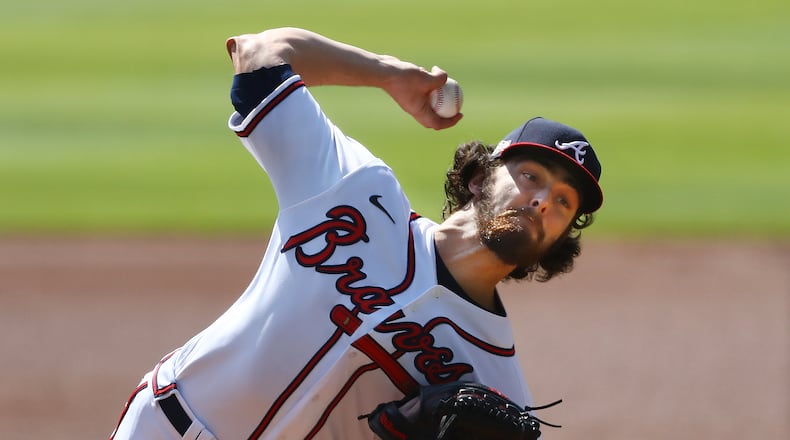His birth certificate says Ian Anderson is 22 years old. His resume states that he had never thrown a single inning of postseason ball before Thursday’s start for the Braves in Game 2 of their wild-card series. But today the Cincinnati Reds are thinking all that must be a misprint or some gross clerical error.
Because with the poise of an old hand and a menu of effective pitches that runs about as long as the breakfast items at Denny’s, Anderson hung six more scoreless innings on the Reds on Thursday. And Braves rode a tall wave of zeros to a sweep in the best-of-three series and on to next week’s Division Series.
“It’s something else how he handles the whole thing,” said Anderson’s manager, Brian Snitker. “I look all the time between innings and see his reactions. He doesn’t look his age. It’s like he’s out there on the sandlot playing ball.”
To this sandlot, Anderson took a fastball that topped out at 97 mph in a strikeout of Reds first baseman Joey Votto – the quickest clocking the kid has had in his now seven major league starts – and mixed that with 28% curveballs and 28% change-ups to limit Cincinnati to no runs and only two singles over six innings.
That makes him just one of four pitchers in Braves history who worked at least six scoreless in their playoff debut. Two of the others are golden oldies – Bill James (1914) and Johnny Sain (1948). The other is a little more recently familiar – Steve Avery, who was only 21 when he shut out Pittsburgh over 8-1/3 innings in the 1991 National League Championship Series.
Snitker can speak to ’90s-era guys such as Avery and Tom Glavine and John Smoltz, who like Anderson became postseason staples all in their early to mid-20s.
“Those guys were the same, too. They were flatline. You didn’t know if they were five up or five down, ever,” Snitker said in the most complimentary kind of comparison. “This kid competes just like those guys did. He’s about as fierce a competitor as I’ve ever been around.”
Really, though, what choice did Anderson have but to go out and shut down Cincinnati? That was the standing order of this brief series, the Reds held scoreless for 22 innings, with added thanks to Game 1 starter Max Fried and an utterly dominant bullpen.
“It was special to be a part of,” Anderson said of the scoreless inning streak. “All the credit to Max for going out there yesterday going pitch-for-pitch with (Reds starter Trevor) Bauer and setting the tone for us. Then obviously our bullpen coming in and doing what they’ve been doing all year, you can’t speak enough about how good those guys are.”
“My mindset was to keep that going today. That is how I kind of went into it, build off how those guys did and know if I can go five, six, seven (innings), we got guys who can shut it down,” Anderson said.
The only outwardly nervous moment for Anderson on Thursday was the second inning, when he issued a four-pitch walk to Freddy Galvis – Anderson’s second walk of the inning – to load the bases with two outs.
Out popped Braves pitching coach Rick Kranitz, who reminded Anderson he had plenty for the Reds' No. 9 hitter, Tucker Barnhart, and to trust that. “That seemed to settle me down,” Anderson said.
So it would seem. The threat ended on a Barnhart grounder to second. After his egregious walk, Anderson would retire the next eight consecutive Reds, and 13 of the 14 he would face from that point. Eight of his nine strikeouts would follow as well.
When spring began, Anderson was the highly touted prospect taken third overall in the 2016 draft who seemed destined for another year of seasoning away from the big club. But injuries and opt-outs riddled the Braves' rotation. And Anderson was rushed to the front.
So effective was he that Anderson quickly - after only six major league starts - assumed the No. 2 spot behind Fried.
“As the season started out in spring training, I thought there’d be a chance I would get up here and make an impact,” Anderson said. “I didn’t think it was going to happen this way – unfortunately – with all the injuries and stuff. It’s rewarding to see how it has played out thus far.”
Such callow front-line guys were considered a potential Braves weakness this postseason. The Braves only had to go two deep against the Reds, but between Fried, who made his first postseason start Wednesday, and Anderson, those two just combined for 13 innings worth of scorelessness. Admittedly, this wasn’t the Big Red Machine of yore they faced – more the Little Red Wagon of a lineup – but how could they do any more than allow nothing?
Going forward, that makes a manager smile.
“We have all the confidence in those young guys,” Snitker said. “I remember (former manager Bobby Cox) told me one time, you need to grow your own, and we have, and it’s a pretty good stable of young, home-grown pitchers. You root for them because they’re all good kids, they’re all very studious in what they do, they want to get better. And you happy for them when they do.”
It’s important to stay stoic on the mound, Thursday’s young pitcher advises. Did we mention he is mature beyond his years? “You try to not show the other team anything when you’re out there, whether you’re throwing the ball well or getting hit around a little bit,” Anderson said. “That’s a big advantage if you stay level.”
But after Anderson was relieved in the seventh, he was nothing but happiness and fist bumps for the rest of the game.
“You go out there and win those two games like that, how can you not smile?” he said.
About the Author
Keep Reading
The Latest
Featured



